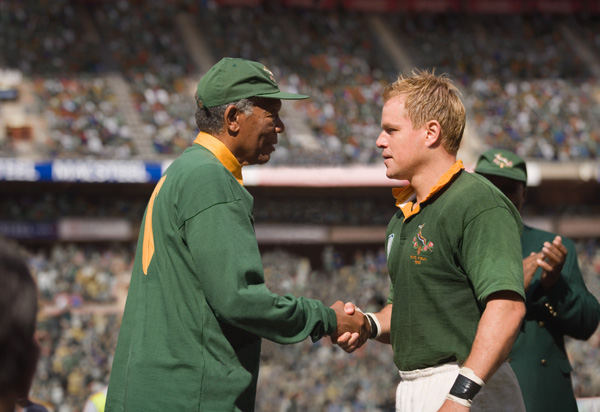Movie review by Greg Carlson
Like many of Clint Eastwood’s recent films, “Invictus” takes its sweet time to arrive at a conclusion determined from the opening moments. A glossy and superficial account of the 1995 Rugby World Cup in South Africa, the movie blends biopic with traditional sports genre elements, including lengthy sequences in which rugby games are photographed from every possible angle. Morgan Freeman plays Nelson Mandela with authority and gravitas, but too much of the dialogue is reduced to aphorism and platitude, conveying the feeling that as a political leader, Mandela was more angel than human.
Alongside Freeman, Matt Damon takes on the role of Springbok captain Francois Pienaar, the Afrikaner flanker who came to understand the transcendent potential of a World Cup victory once Mandela reached out to him. Somewhat strangely, Damon is given very little to do outside of his athletic duties, a frustrating aspect of a movie that might have had much more to say about the key personalities in one of South Africa’s most suggestive and meaningful sports accomplishments. Pienaar leads the team that black South Africans cheered against, but his presence in the film is unusually apolitical.
“Invictus” follows a linear chronology that builds some momentum as the story unfolds, but the one-thing-at-a-time structure tries the patience when so many scenes alternate between snippets illuminating Mandela’s ulterior motives for taking such a keen interest in rugby and the progress of the Springboks as they struggle to develop a winning team. Eastwood carefully modulates the way we come to know Mandela, opting to focus on the man’s incredible sense of forgiveness in the service of healing national wounds rather than on any particular demands of his role as the newly elected President of South Africa.
For all the time Eastwood lavishes on rugby, the audience learns very little about the rules of the game or the individuals who made up the championship Springbok team. Ironically, Mandela is shown in one sequence studying a roster in order to be able to greet each player by name, but with the exception of Pienaar and Chester Williams, the only non-white member of the 1995 Springboks, the viewer is not expected to differentiate among the footballers. Despite Williams’ claims that some of his own teammates spurned him with racist name-calling, the movie version focuses on Mandela’s anxiety that the winger’s injury will prevent him from being a visible black representative when the Boks take the field.
Eastwood’s decision to refrain from procedural explanations of rugby will divide viewers, but “Invictus” strains to make clear the tensions and stakes of post-apartheid South Africa. Mandela shrewdly understands the symbolic power of showing up in Pienaar’s green and gold number 6 jersey, and Eastwood guarantees the audience won’t miss the point either. An economical subplot concerning the racial integration of Mandela’s security detail covers the same territory, as does a series of shots in which a small boy, unable to gain entry to the Ellis Park final, loiters near a car to monitor the game on the radio. The toughest cynics will have a hard time swallowing the climactic displays of black/white esprit de corps, but more shocking is the truth of the historical record. Yes, Eastwood suggests that Mandela almost singlehandedly orchestrated the World Cup championship, but the against-the-odds win of the Springboks is a perfect illustration of real life drama tailor-made for big screen adaptation.
